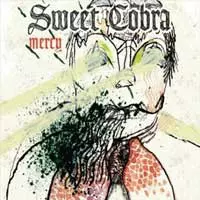Remis is a monster. Gagovski is a destroyer. Arluck and Lanham were twin alchemists.
At the mic and the low end, Remis (as Botchy Vasquez) is fearsome. The figurehead of audio destruction. He transforms into some sort of beast. As a musician, he becomes someone that you actually fear to meet off stage. Remus is monster.
Systematically stacking his drum parts, Gagovski carries each song on a bed of steady thudding rhythms, ancient and calculated. His hits are steady, gruesome, layered, and designed to topple civilization. Gagovski is destroyer.
Together, Arluck and Lanham were visitors from a strange land, constructing formulas for strange brews. As one pushed for this simplest line to take, the other found the perfect melodic formulation and pushed the band further and further. Arluck and Lanham were alchemists.
Sweet Cobra has always played like a hammer being dropped from a 12-story building--their riffs are plummeting, building until the moment of impact, which shatters. There's a sense of urgency; there's that feeling that you're falling in a dream. With Mercy, the band take it one step further, exploring the possibilities afforded to them by toning down the distortion and experimenting with moments of extreme harmonics in vocals and guitars.
And while Mercy rips through the listener's ear drums with just as much force as their previous two full-lengths, for the first time, the album feels like a total complete work. The expansion of their sound past the audio equivalent of "fuck shit up" unfolds as the album progresses, and the results are wonderful.
But there's a deeper emotional core to this album. Shortly after its completion, guitarist Mat Arluck lost his fight with cancer. Knowing this when listening to the album gives it a different weight. "Sprague Dawley," the album's closer, was written almost solely by Mat about the treatments he was undergoing.
Similarly, the Remis-written tune "Brux," about his own brother, takes on a new meaning:
"Brother / I feel your pain / your efforts are not in vain / Your demons are my demons."
Mercy, as a whole, has a flow from song to song. Each one plays off the last and sets up the next. The overall effect is a brutalized journey that the listener takes. It's a trip through the desert with sand stinging your eyes, jackals at your heels, and a blurry mirage promising not even enough to get you through. It's safe to say that I couldn't imagine a better legacy for Arluck. He and his bandmates gave what they had in them for this record, and it shows.
It's strange trying to examine the importance of this album outside of the songs presented. The best art tends to be created under certain parameters--strict verse has been the bane and boon of the poet over the years, and Rumours is the sound of two marriages falling apart. But to extend those parameters to a matter of life and death seems trivial, and yet it's hard to imagine Arluck not having to consider this matter when going into the studio.
And it fucking sucks to think about, too. This album is going to get sub-perfect scores from a variety of publications. Arluck's death is going to be a footnote that's used as a human interest angle in some magazines. But that's not what this is about.
This is about four dudes going into a studio and beating the shit out of themselves until they came out with one of the most emotional metal/hardcore albums I've ever heard. You can hear it in the melodic guitar parts during the chorus of "Matriarch." You can hear it it in "Mercy," when the song slips from the melodic opener into the thundering verse. You can hear it in the breakdown of "Sprague Dawley," written by Arluck and named after a preferred genetic strain of lab rat.
What's the closer for this review? There's not really any way to end this correctly. Shit. I'm getting choked up here writing this damned thing, and I never had the chance to meet Arluck. But I do know one thing: Mercy is worth every blood-soaked minute these guys put into it, and I'll be damned if I accept any other response by any other critic.
